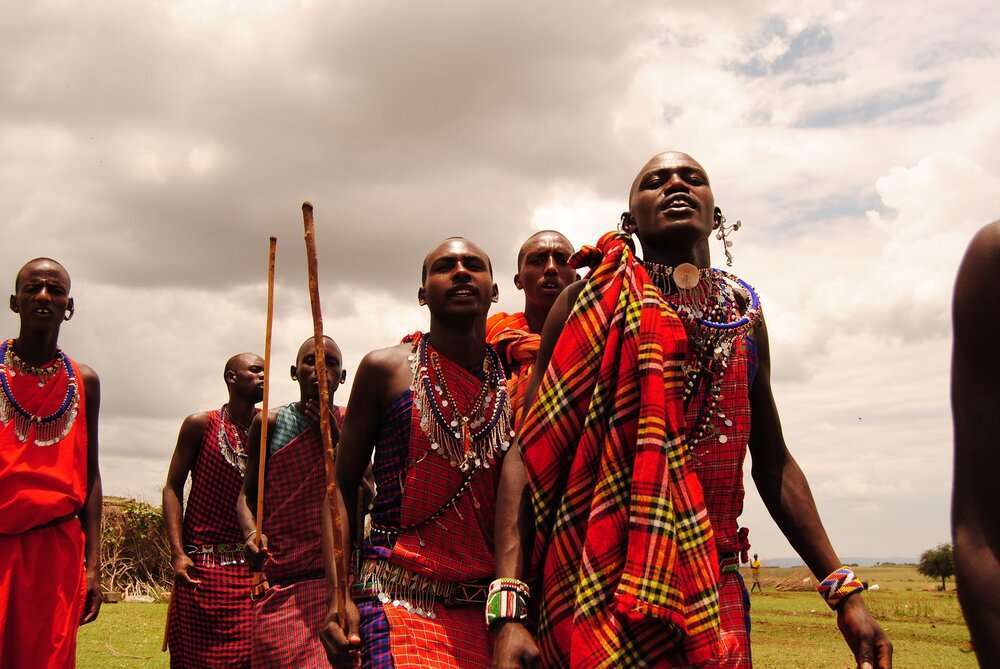Maasai (not Masai) is the correct spelling of this noble tribe: it means people speaking maa. Masai was the incorrect spelling of the British settlers and has remained in current use. The Maasai have always been special. Their bright red robes set them apart visually. Spear in hand, they are calm and courageous regardless of the danger.
The armed British troops who drove the Maasai from their lands in the early 20th century had great respect for these fearless tribesmen. Up until recently, the only way for a Maasai boy to achieve warrior status was to single-handedly kill a lion with his spear.
MWCT works primarily with the Maasai living the the Kuku Group Ranch. The Kuku Group Ranch is home to around 17,000 people and lies in an important migration corridor of 375,000 acres that is at the base of Chyulu Hills, Hemingway’s, “Green Hills of Africa,” in between Tsavo and Amboseli National Parks.
This is home for East Africa’s most iconic wildlife including: lions; elephants; leopards; zebra and giraffes. The land contains important resources not just for the people of Kuku, but the habitat reserves, forests that are carbon sinks, and rivers and springs supply fresh water to more than 7 million people living in and around the port city of Mombasa, Kenya’s second largest city.
MWCT’s international team of experts works with the Maasai community on a knowledge-sharing basis to create and implement holistic and comprehensive programs in conservation, health, and education that serve the community, the wilderness, and the wildlife that are so important to us all.
HISTORY
Kenya recognizes over fifty tribes of native people. The Maasai were the dominating tribe at beginning of 20th century. They are one of the very few tribes who have retained most of their traditions, lifestyle and lore. In common with the wildlife with which they co-exist, the Maasai need a lot of land. Unlike many other tribes in Kenya, the Maasai are semi-nomadic and pastoral: they live by herding cattle and goats.
The Maasai have not fared well in modern Africa. Until the European settlers arrived, fierce Maasai tribes occupied the most fertile lands. The Maasai struggled to preserve their territory, but their spears were no match for armed British troops, and their lawyers never had a fair chance in British courtrooms. In 1904, the Maasai signed a first agreement, losing the best of their land to the European settlers.
Seven years later, in 1911, a very controversial agreement was signed by a small group of Maasai, where their best Northern land (Laikipia) was given up to white settlers. Surely they did not fully understand what the consequences of such a treaty were, and anyway the signatories did not represent the entire tribe. With these two treaties, the Maasai lost about two-thirds of their lands and were relocated to less fertile parts of Kenya and Tanzania.
Other tribes of Kenya have adapted more readily to the “progress” of modern times. In contrast, the Maasai have persisted in their traditional ways, so as Kenya takes more land for growing tribes and agriculture, they suffer.
FUTURE
Less land for an ever growing Kenyan population means less land for the Maasai, their livestock, and wildlife. More and more, a lion will take a cow or some goats and get killed in retaliation.
Lions are a disappearing species: their numbers plunged from 100,000 ten years ago, to about 14,000 today. Maasai Wilderness Conservation Trust has pioneered a compensation program, reimbursing livestock killed by lions (and other predators). The program is supported by Campi Ya Kanzi tourist conservation fees and employs warriors as lion scouts.
In the past, the Maasai and the wildlife simply lived together, in balance. If this could be re-established, by showing to the Maasai the economic value of the presence of wildlife in their land, the future of the land, of the wildlife and of the Maasai people will be assured.
This is exactly what Maasai Wilderness Conservation Trust does. We are thrilled by having been awarded the UNDP Equator Prize and by having had our Chairman, Samson Parashina, named Champion of the Earth by UNEP. Never before these prestigious United Nations Awards were given to the same organization.



